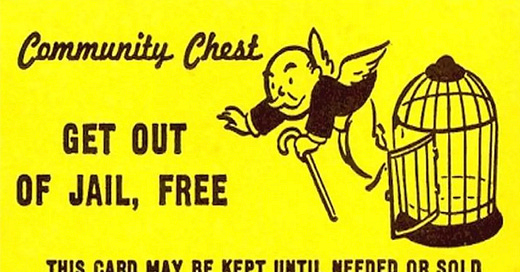Playing the 'Get Out of Jail Free' Card
And why, after being relegated to the irrelevant category for so long, accounting gimmickry might finally not be so great again.
On the Agenda…
With the market wobbly, age-old financial engineering may be starting to backfire.
Such things as stock-based compensation and overpaying for acquisitions to mask slowing growth may finally get the respect they’re due.
Companies at risk: Even with the cover of tariffs, which may provide a one-time “Get Out of Jail Free” card, some may have pushed one financial lever too many to clean up their own messes.
Ten companies to watch, including one that hits the trifecta of trouble.
You don’t have to be blind to see this one coming…
With earnings season about to start, I’m not just talking about companies cutting guidance (just you wait!) or withholding guidance altogether (already happening) .
Don’t be surprised if some companies go one step further and use the tariff-tied trauma the same way they might use the weather and other the exogenous events du jour to conveniently sweep the dirt from under the rug to out the door… as if it was never there.
Happens all the time. But as big and widespread – and in many cases as justified as the tariff excuse may be, pause or no pause – there are some companies that may already have pulled one lever too many to make themselves look better than they really are.
That Leads to the Question…
Which companies are so deep into using every accounting trick in the book that it’ll be too late to use the rare “Get out of Jail Free” card as cover to clean up their own mess?
We’ll know soon enough, but there is no question that earnings, EBITDA and free cash flow can only be adjusted, double-adjusted and triple-adjusted so much before they can’t be adjusted any more, let alone tossed out with the garbage to get a clean slate. The aggressiveness is simply too ingrained in their business models for it to matter.
I’ve had this theory – and it’s just that, a theory – that if this mayhem continues for much longer, especially if the market goes into a prolonged swoon, the accounting games people have played increasingly may be starting to come back to haunt some of them.
After all, such quaint things as poor or declining earnings quality thanks to all sorts of legal but addictive financial shenanigans – which decades ago used to have sway over stocks – have been relegated into irrelevance.
Such Things As….
The long-running controversy over stock-based compensation, which helps boost earnings.
The potential for a surge in goodwill impairments, the result of overpaying for acquisitions.
The trend toward extending payables, which can help exaggerate reported cash flow.
And as a wild card, there’s always the firehose of convertible bond issues by many of these same companies, which makes their potential challenge that much greater.
All of these issues are yawners in a market that did nothing but go up, as management teams got themselves hooked on the drug of thinking they’ll get from here to there by pulling every financial lever available to them before anybody notices.
Investors looked the other way for the simple reason that companies were meeting or beating their own guidance, at times using metrics that seemed made up. Stocks went higher. Everybody thought they were a genius.
Which Begs the Question…
What happens if stocks not only stop going up, and not only go down… but stay down for a prolonged period?
And if they do, which companies are the most vulnerable to be being boxed-in by their own aggressiveness… to the point that earnings quality (or lack thereof) actually matters?
I’m not the only person thinking about this…
Turns out (not surprisingly) my friends Bill Whiteside and Jeff Middleswart at Behind the Numbers, who are steeped in the details and nuances of financial statements, are way ahead of me. They’ve been writing about these very issues for years, but think that regardless of what happens with the tariff situation or the markets, the stage is set for a perfect storm of sorts… one that could be a direct hit on some of these companies.
Or as they put it to me…
Many companies will try to reverse depleted accruals or take charges in this quarter in the hopes of using the unusual conditions as an excuse for the poor performance. It will be interesting to see who does that and maybe who doesn’t.
Indeed it will. It’s impossible to say for sure, but some are at greater risk than others. If you already subscribe to Bill and Jeff’s work, which I highly recommend, none of this will be new.
If you don’t, they were kind enough to share several of their lists with me, which I’ve whittled down to…
The 10 Most Vulnerable
Or the 10 that would appear to be among the most vulnerable because of excessive goodwill and stock-based compensation. Not surprisingly, they include one name that happens to be on my Red Flag Alerts list…




